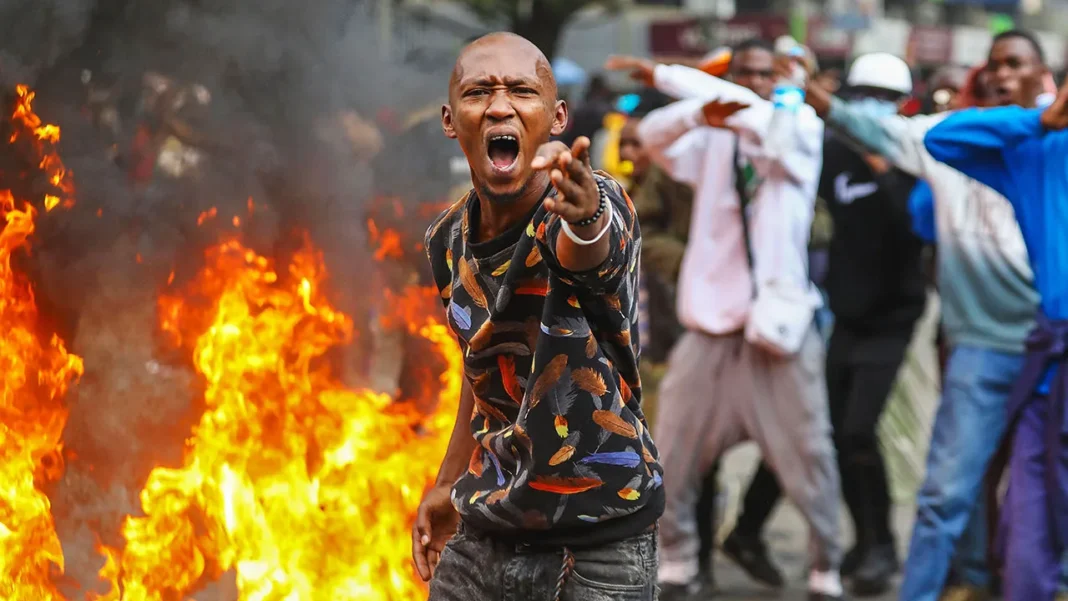The Kenya’s Finance Bill 2024 in Kenya has ignited nationwide unrest across the nation with over 20 being killed so far, culminating in a dramatic response from President William Ruto.
Passed by a majority in parliament, the bill aimed to generate an additional $2.7 billion through various tax measures to alleviate Kenya’s mounting public debt, which currently exceeds 68% of its GDP—a figure well above the recommended limit set by international financial institutions like the World Bank and IMF.
Tax Measures and Public Reaction
Among its provisions, the Kenya’s Finance Bill 2024 introduced a 16% Value Added Tax (VAT) on bread, increased taxation rates on mobile money transfers—an essential component of Kenya’s digital economy—and imposed a new annual tax on car owners. Additionally, the bill targeted a range of everyday products deemed environmentally damaging, including packaging, plastics, tires, diapers, sanitary pads, computers, and mobile phones. It also proposed applying VAT to specific financial services and foreign exchange activities.
The Kenya’s Finance Bill 2024 passage sparked immediate public outcry and protests, particularly among Kenyan youth who organized under the banner “7 Days of Rage.” Hashtags such as #RejectFinanceBill2024 and #OccupyParliament trended on social media platforms, with demonstrators demanding the bill’s withdrawal to alleviate the economic burden on ordinary citizens already grappling with rising living costs.
Escalation of Protests and Government Response
The demonstrations escalated into confrontations between protesters and authorities, notably in Nairobi where some demonstrators attempted to set fire to the Parliament building. Security forces responded with tear gas, water cannons, and in some cases, live ammunition. The government’s heavy-handed response resulted in casualties, with at least 23 people reported killed and many more injured, according to the Kenya Medical Association.
The violent crackdown intensified public anger and criticism, not only towards the Finance Bill but also towards President William Ruto’s leadership. Despite announcing his refusal to sign the bill amidst the escalating unrest, Ruto’s handling of the protests has drawn widespread condemnation. Journalists and activists have denounced what they describe as police brutality against peaceful demonstrators, emphasizing the need for genuine leadership and meaningful reform.
Political and Social Fallout
The aftermath of the protests has deepened political divisions and raised questions about Ruto’s legitimacy as a leader. His labeling of protesters as “treasonous” further fueled public discontent, prompting calls for accountability and transparency in governance. Analysts suggest that Ruto’s response has eroded trust in his administration, making it uncertain whether his reversal on the Finance Bill will appease public grievances or merely underscore existing distrust.
International and Economic Implications
Internationally, the unrest in Kenya has drawn attention to the country’s economic challenges and governance issues. The IMF’s recommendations for fiscal austerity and debt management remain pressing concerns, with Kenya needing to address its fiscal deficit and broaden its tax base to qualify for additional financial support. The outcome of the Kenya’s Finance Bill 2024 will likely impact Kenya’s economic stability and investment climate in the coming months.
Path Forward and Public Sentiment
Looking ahead, the Kenyan government faces the challenge of restoring calm and addressing underlying grievances highlighted by the protests. Civil society groups, activists, and opposition parties continue to call for accountability, urging comprehensive reforms to address socio-economic inequalities and improve governance standards. The upcoming political landscape will be shaped by how the government navigates these challenges and rebuilds public trust.
Conclusion
Kenya’s Finance Bill 2024 has sparked a significant socio-political upheaval in Kenya, exposing deep-seated frustrations over economic policies and governance. President William Ruto’s decision not to sign the bill reflects the intense pressure from protests and public outcry, yet questions persist about the government’s responsiveness and commitment to addressing citizens’ concerns. As Kenya moves forward, the aftermath of this crisis will test its resilience and ability to enact reforms that foster inclusive growth and stability.


